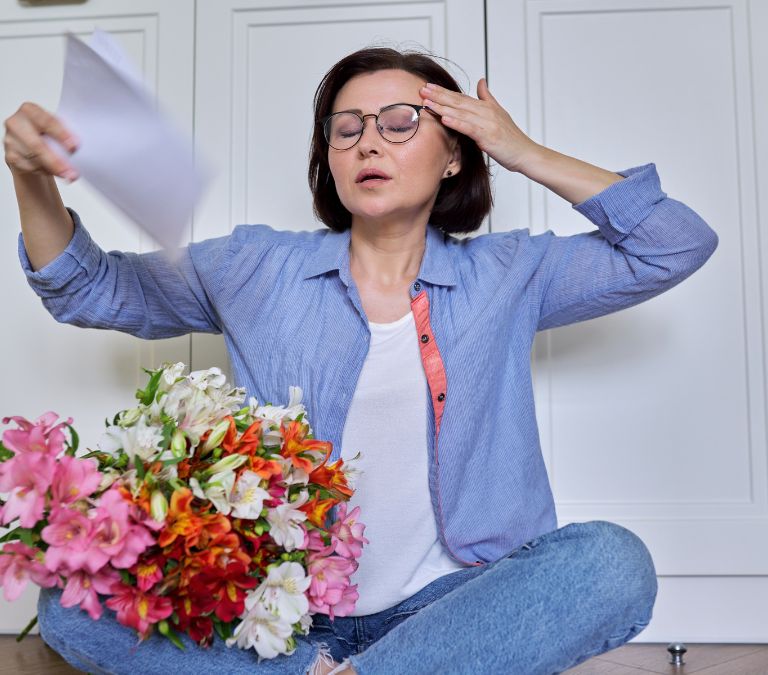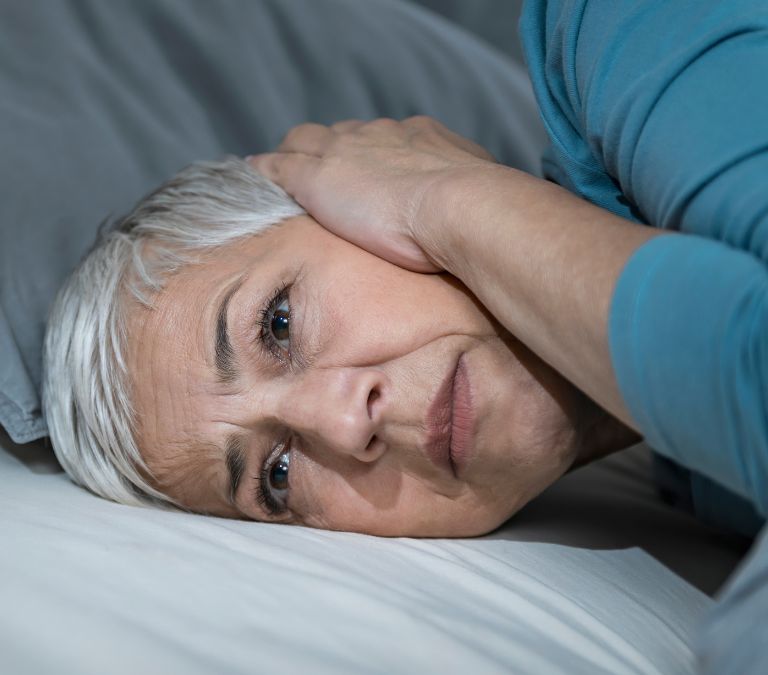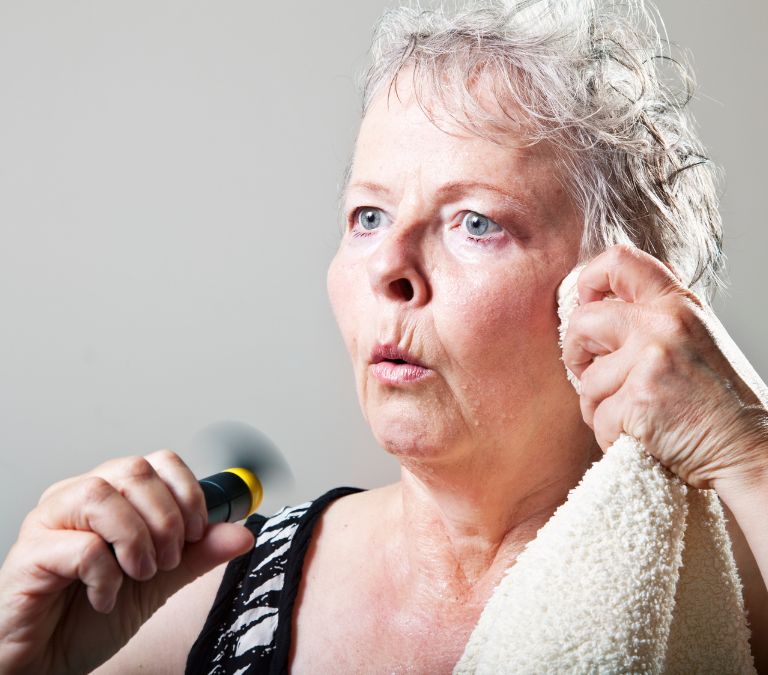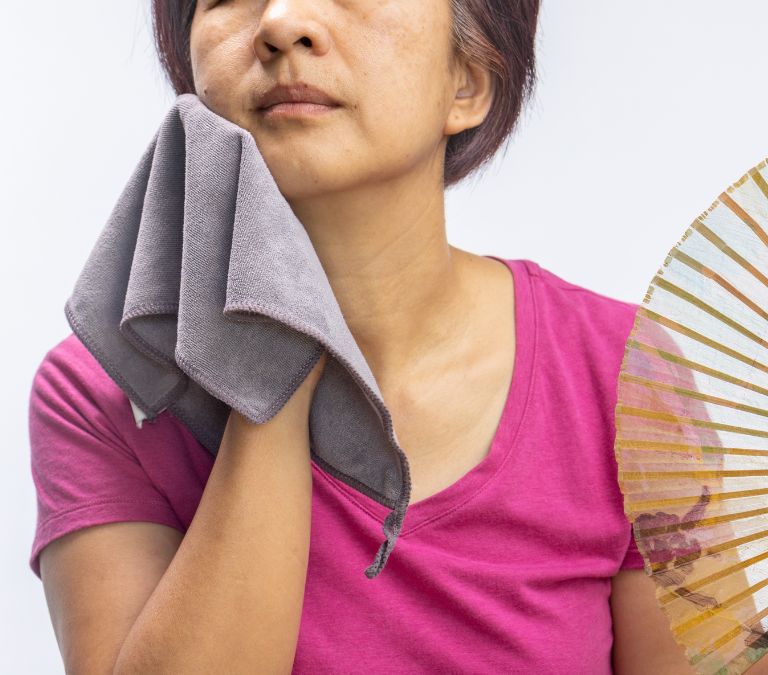Hot flashes refer to a sensation often interpreted as heat or hotness in the upper region of the human body. This feeling could last for hours or minutes with symptoms such as dizziness, heart palpitations, redness of the skin, and even sweating.
Hot flashes are due to internal thermostat regulations in the body. When the hypothalamus senses excess heat in the body, your heart is triggered to pump blood faster, speeding up metabolic activities. A cooling sensation is seen after this feeling brings sweat.
Although hot flashes have several causes, when you mention “hot flashes,” most people will think of the symptoms associated with menopause. Still, menopause is just one of the causes of hot flashes. These symptoms are often the effects of mild infections and other causes; still, there are times when it might be something more serious than you anticipated.
Many women have keyed into the “hot flashes means menopause” myth which is not always correct. As normal as it seems, mistaking a disease for another due to similar symptoms can sometimes be deadly. Although it happens commonly, many people have lost their lives because they took medications not meant for their illnesses.
As a woman near menopause reading this, you should not just assume that the hotness at the lower part of your abdomen is due to menopause. It would be best if you tried to be sure by seeking medical attention sometimes.
Another popular misconception is that any temperature rise is a hot flash. There are times when our temperatures rise above normal, and we experience unusual sensations that are very similar to hot flashes, yet, they are not hot flashes.
It is advised that before you conclude on your symptoms, you should try to adjust the temperature of your environment. You can turn on your AC or fan, take a cool bath and see if the symptoms persist. If it does, then you are sure it might be hot flashes.
Other Causes of Hot Flashes
Menopause remains the most popular and ideal cause of hot flashes, although several other causes exist. We must be able to discern the main cause of the hot flashes before taking medications.
One thing you should know is that hot flashes do not come independently. They are always an indication of an underlying condition or might be a manifestation of a certain reaction or physiological occurrence in your body. Below are some of the non-menopausal causes of hot flashes.
Effects of certain foods and medications
So many drugs and food substances are not compatible with our body systems, and sometimes allergic reactions occur in the form of hot flashes. Medications like Raloxifene, Tamoxifen, and Nolvadex have side effects that resemble or completely imitate hot flashes.
Many other drugs have hot flashes symptoms as side effects, so we should be very careful before we act upon them.
Always seek medical advice whenever you undergo these symptoms, especially after taking a drug.
Besides drugs, our food can also cause allergic reactions from hot flashes. Hot peppers and other spicy foods stimulate certain never-ending feelings leading to a very hot sensation that is manifested as hot flashes.
Some people are allergic to alcohol and would develop symptoms of hot flashes when they drink, especially when they get drunk.
Stress or emotional imbalance
Some people get so angry that certain impulse networks are stimulated. If you’ve ever encountered very emotional individuals with poor anger management, you’d realize that when they are angry, it gets to a point where they begin to sweat, stutter or vibrate.
Sometimes, it goes more than that. The extreme emotional impulse stimulates the release of epinephrine and norepinephrine.
These hormones react in certain ways to restore the person’s emotional equilibrium, and because they operate with a flight or fight response, the body is trussed. The upset leads to headaches and warm sensations that might lead to hot flashes.
Other health causes

According to research, the main stimulator of hot flashes is the hypothalamus. This realization means that any hormonal or non-hormonal activity that triggers the hypothalamus can cause hot flashes.
The hypothalamus is altered by varying amounts of estrogen, which is mostly linked with menopause. Still, there are cases of hormonal decline that don’t indicate menopause in women.
Disorders relating to heating of the system can internally trigger the hypothalamus too. Most times, non-menopausal hot flashes are caused by heart traumas, genetic disorders, eating disorders, and other diseases that would lead to hypothalamus dysfunction.
Hormone replacement therapy has a huge success rate for patients with hypothalamus dysfunction.
Certain infections imitate the symptoms of hot flashes. This characteristic is seen in common fevers. Sometimes fevers are mistaken for hot flashes, but they are just fevers.
Also, some cancerous tissues can create similar symptoms by releasing carcinogen-like substances into the body.
Note
This article aims to help you distinguish between the various variants of hot flashes. You must understand these symptoms properly before you take any medication.
Sometimes, you would be unable to verify these symptoms on your own. In times like this, you must seek the opinion of a health professional.
You should also make sure you open up to your doctor so he can give a proper diagnosis and proffer health solutions. Tiny details, like the food you ate, where you traveled to, and even the hotel you lodged, can help the doctor develop a better diagnosis and treatment.
A doctor’s diagnosis is very important because some medical symptoms are similar yet different at other times. Two different diseases might pose the same illness.
How to Know if Hot Flashes Are Menopausal or Not
Menopause is a highly anticipated period in a woman’s life cycle. For some, the anxiety is due to the joy of not dealing with the stress of monthly cycles and menstruation. For some others, it is the fear of its dangers and side effects.
Either way, many people cannot efficiently deduce when menopause has started for them. While some women start menopause by 42, others start by 45 or even 50, making age an unreliable determinant for menopause, although it still gives you a range you can work with.
Not being able to deduce your menopausal status is very dangerous. I say so because as women enter this stage, their lifestyles change, ranging from their sexual life to medication and nutrition.
For instance, a woman who thinks she is in her menopause might have unprotected sex with her husband even when she doesn’t want to have children. The symptoms that led her to believe that she was past menopause were false or misdiagnosed, she could get pregnant, and this development would be risky for her and the child.
One menopausal symptom that stands out is hot flashes. Although these symptoms are very common and often a good indicator of menopause, we must be careful as hot flashes can be due to other conditions or sicknesses.
But how can you know if the hot flash is menopausal or not? Well, that is why we have other symptoms. You should always compare and check out other symptoms of menopause before you conclude.
Here we will talk about other menopausal symptoms that could help you confirm if your hot flashes are menopausal or not.
Although you know the age range within which menopause can set in, you are never sure of when it will begin for you. Before menopause sets in, certain perimenopausal symptoms might indicate menopause; you must be very self-aware once you clock 40.
Below are some symptoms you should watch out for to confirm menopause.
Irregular periods
A normal healthy lady experiences a cyclic or regular occurrence of menstruation. This pattern of occurrence means that although the cycle might change, she sees her period in a certain monthly pattern of about 28 days or very close.
If for any reason, you begin menstruating within absurd intervals like 16 days, then 19 days, then 13 days, you should know that something is wrong.
You should not be alarmed but cautious. Calm down because some chemotherapy drugs can also alter menstrual cycles, so you should see a doctor and pay attention to yourself.
The good thing about diagnosis is that one symptom cannot verify an illness. If your menstrual cycle becomes irregular, you can confirm menopause when you experience most or all of the symptoms listed here.
Just before menopause, it is often very difficult to deduce your next menstrual flow or the rest of the season because the cycle at this point is altered to a decline in estrogen level. This uncertainty means that irregularities might be an indication or a confirmation of menopausal hot flashes.
Sleeping problem

Insomnia and sleep disorders are popular symptoms of menopause. So when you experience hot flashes and wake up in the middle of the night, it could just be menopause.
Although various causes of insomnia might not be linked to menopause, we should still carefully access our symptoms. If this sleeplessness persists for a while without any explainable cause, then you should see your physician.
Mood swings
Depression and mood swings are caused by psychological, mental, emotional, or even physical reasons. But during menopause, the moody feeling is caused by hormonal imbalance.
There is often a feeling of anxiety and depression that is beyond one’s control normally. If you’ve noticed these constant mood swings alongside hot flashes and about two other symptoms, you should ensure you see your doctor for proper diagnosis but trust me; you’re just on the verge of menopause.
Forgetfulness
Again, memory loss is not new to women, men, and children, so many conditions can lead to partial or complete memory loss. Usually, forgetfulness is normal amongst middle-aged and old fellas, but sometimes it becomes more than normal.
Always ensure you see your doctor. It’s always advisable to have regular medical checks, even if the symptoms you suspect are wronged. And if you’re being forgetful alongside other symptoms, it could be menopause.
Sex becomes less pleasurable.
During menopause, certain transformations in your body, like vaginal dryness and low libido, can arise. These transformations in a menopausal woman’s body often lead to painful intercourse and less pleasure.
Older women are said to value sex less than younger ones. This change is a very big indication that the woman has reached menopause. Lubricants are mostly used to aid the vagina dryness, yet other infections can cause vaginal dryness and painful intercourse.
Don’t get me wrong, some women enjoy sex more during menopause and have their best sexual experiences after menopause. Still, low libido is an indication of menopause.
Physical changes
As you grow older, your skin becomes scaly and thinner. This change is mostly an indication of old age; still, it shows menopause. Some women are also known to add weight during menopause.
Accumulation of abdominal fat, pain around joints, and so many other physical changes might be due to menopause. These changes are often due to hormonal decline during menopause.
The emergence of cardiovascular diseases
Heart diseases are linked with estrogen levels. According to research, certain metabolic processes within the heart decline when the estrogen level reduces. So, the heart of older women becomes more susceptible to cardiovascular diseases due to the rise in cholesterol levels.
Most times, women in menopause are diagnosed with mild to severe heart issues, like heart failures and cardiovascular murmurs. These conditions are why it is often advised to maintain a healthy lifestyle during menopause.
Osteoporosis

The bones of women become more brittle and weaker as they approach menopause. Although the mechanism is not fully understood, osteoporosis is a severe case.
This medical issue is why women in menopause break their spines or wrists after minor accidents. The osteoporotic condition is, however, a good marker of menopause.
Other Reasons Why You Might Be Menopausal
The symptoms of menopause are too plenty to count, yet none is definitive and very reliable. To confirm menopause, you should check for as many symptoms as possible.
Many people begin menopause without being aware, and sometimes it might be costly. Although menopause is said to begin at about 49 years of age or more, there are certain reasons why you might be in menopause already.
Do you have irregular heartbeats?
Irregular heartbeat and systemic murmurs are very common among menopausal women. Various forms of arrhythmia are also present during menopause. You should ensure that these symptoms are reported to the doctor as soon as they are discovered.
Do you have a body odor?
Although it sounds funny, night sweats and hot flashes usually cause a very unpleasant order from the female’s body. Stress symptoms from menopause can also cause sweat which can cause odor.
Are you overly sensitive?
Women are often saucy during menopause. They behave in such a way due to a decline in hormonal balance and other symptoms relating to menopause. Most of the time, they become very sensitive and are irritated by the slightest issues.
Do you have panic disorders from time to time?
Panic disorders are very common during menopause. These panic disorders are mostly due to the anxiety and depression faced during menopause. It could also be due to direct hormonal fluctuations.
Is your breast sore?
Although very rare, if you have had soreness in the breast for more than two months, you should quickly see your doctor. Chances are you have reached menopause.
Do you have a low sex drive?
If your answer is yes, then you might have reached menopause. Aside from sex not being too pleasurable due to pain, some women have a low sex drive and delayed arousal due to low levels and estrogen and testosterone.
It can also be due to depression and mood swings. Either way, as menopause nears, some women begin begun have low libido. You could be on the verge of or past menopause if you are one.
Is your vagina usually dry during sex?
Many women face this problem during menopause. Normally estrogen helps lubricate the vagina facilitating the free flow of blood around the vagina but with declining levels of estrogen. This estrogen secretion to lubricate and moisten the vagina might stop, leading to a dry vagina and painful intercourse.
Do you have constant headaches?
Although it is normal to have headaches after a very stressful event or occurrence, sometimes it becomes recurrent or too severe. Migraines and other variants are often noticed.
You should see your doctor and ensure you’re treated if you’ve been having constant breakdowns and pains that are not normal.
Do you feel tingling sensations in your arms and legs?
Fluctuating hormonal levels affect the nervous system leading to the release of certain impulses that cause a tingling sensation. Tingling of the hands and legs are symptoms of menopause that one should not ignore.
Does your mouth burn?
The drop in the estrogen hormones leads to a decline in the sex hormone quantity found in the mucus hormone of the mouth. This Burning mouth is usually not comfortable and painful.
Symptoms like burning sensations, lip tenderness, heat, tingling, and a blurred feeling around the mouth.
Frequently Asked Questions
Can hot flashes be caused by something other than menopause?
Yeah, although most hot flashes are due to menopause, some manifestations of hot flashes and sweats are due to other conditions like thyroid deficiencies, carcinogens, medications, and certain allergies.
How Long Do Hot Flashes last?
How long hot flashes last depends on your unique body anatomy and approach. Without medical intervention, hot flashes can last for about 6 to 12 years, although sometimes, it doesn’t even last a year, so it is wholly dependent on the person.
Should you see a doctor for menopause?
Whether or not you should see a doctor depends on your medical symptoms. If you’re healthy amidst the emergence of menopause, then you might not need to book an appointment. However, you should seek a sound health professional’s advice if the symptoms are severe and disturbing.
When does menopause occur?
Although an estimated age group faces menopause, you cannot determine the time of occurrence. It occurs differently and at different times for different women.
For some women, menopause occurs between the age of 42 – 55. Others might start at 55 years and end when they are about 60; we should always be prepared.
Is there a test to diagnose perimenopause or menopause?
Blood and saliva tests have shown great success in determining menopause and perimenopause. Although these methods do not determine menopause directly, they make it possible to make evaluations and accurate predictions.
Will my having a hysterectomy cause menopause?
While hysterectomy deals with the removal of the uterus to stop periods and pregnancies, among other things, menstruation is controlled by hormones.
So whether or not the uterus is removed, menopause is unaffected. The only factor that can affect menopause is hormonal imbalance or conditions that might affect this imbalance.
How can I prevent hot flashes?
You can keep these hot flashes at bay by avoiding substances that can serve as triggers. These triggers might include alcohol, caffeine, spicy foods, stress, etc. You can also prevent hot flashes by controlling the temperature of your room.
What can I do to improve mood swings from menopause?
Mood swings are common to all humans. Everyone goes through bad times, giving different types of reactions. The best way to improve mood swings or be happy is to relax your mind and do away with negative thoughts and energy.
Good sleep helps calm the mind and soul. Hence good sleep and rest can help you calm your mood swings.
How many hot flashes are normal in a day during menopause?
The number of hot flashes that can be considered normal varies greatly. Some women experience hot flashes once a whole day. Others might experience hot flashes concurrently throughout the day and have more than 20 different episodes.








